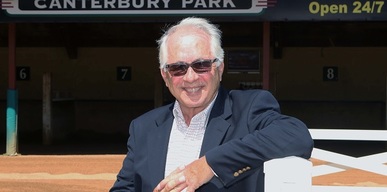A special Thank you to an old-fashioned sort of veterinarian
He is remindful of the way medicine was once practiced, when house calls were a way of life, when the practitioners of the science had a neighborly bedside manner and enjoyed visiting as much as doctoring. Above all, when the care and treatment of the patient went beyond the dictates of the bottom line and the corporate intrusions on time and attention to detail.
There was a price to be paid for such dedication to duty, however, and it was typically expressed with a question from one of his colleagues: “Have you seen Bowman?”
The answer usually could be found by locating the barn sending the tempting scent of fresh bakery into the surrounding atmosphere. Someone made a cake to accompany the morning coffee and had the good Doc’s ear, if, in fact, he didn’t have theirs.
“Doc” is Dr. Dick Bowman, who was the long-time state veterinarian and equine dentist at Canterbury Park, who for many years provided a refuge for the unwanted and displaced horses of the Minnesota racing world and beyond. The Middle Ages had their Francis of Assisi. Canterbury Park had its Richard of North Dakota.
Dick Bowman has saved hundreds of horses from a dismal life if not a dreadful demise once their racing careers have ended, hauling them 600 miles to his North Dakota ranch, then tending to their infirmities, fixing their teeth, feeding them and generally restoring them to the good health necessary to live out the remainder of their lives.
There is a difference between individuals who have trouble saying no and then complain about their own acquiescence. Dick Bowman never said no because that is what he intended. He very simply wanted to help animals in need, because he cares about them.
Bowman has often been repaid with the simple recognition the animals provide. “When I would first get them to the ranch they wanted to be left alone. They didn’t want anything to do with people for a while,” he said. “You couldn’t even walk up to them. Eventually they come looking for us, wanting to be petted, wanting some contact with humans.”
There are other special occasions that can accompany only a true appreciation for horses, when the herd en masse, for example, heads to quench its thirst. “There’s nothing more exciting to hear than a herd of horses running up to the corral for water,” Bowman said. “You’d think it was a herd of buffalo. They sound like thunder. Sometimes they’ll simply come running up to say hello.”
Expenses went on and on for horses, for dental care, for inoculations and for food, always for food. “I shudder to think how much grass and hay they have gone through,” Bowman added. “A horse will eat almost continuously if allowed to.”
Bowman had an equine dental practice involving clients in six states for 17 years, traveling 60,000 miles a year caring for the teeth of horses in Minnesota, North Dakota, South Dakota, Iowa, Wisconsin, Colorado, Kansas, Nebraska and even in Wyoming one year. He sold the practice a while back, which at the time allowed Doc more time to devote to his cattle ranch and the horse adoption program. “It was never a thing that made me money,” he said. “But it’s probably the most fulfilling thing I’ve done in life.”
It is impossible to overstate just how great an impact Doc Bowman had on the aftercare of racehorses. Thank you so much, Doc!






